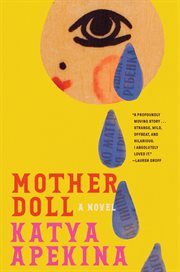Fiction
eBook
Details
PUBLISHED
Made available through hoopla
DESCRIPTION
1 online resource
ISBN/ISSN
LANGUAGE
NOTES
* A Most Anticipated Book of 2024 Selected By * The Millions * Chicago Review of Books * Hey Alma * Stylecaster * And Many More! * Prize-winning author Katya Apekina's Mother Doll is a sharp and visceral nesting doll of a novel, about four generations of mothers and daughters and the inherited trauma cast by Russian history. "A profoundly moving story . . . Strange, wild, offbeat, and hilarious. I absolutely loved it." -Lauren Groff "Spellbinding, hallucinatory, and very funny . . . A rare achievement." -Elif Batuman "Sharply original and surprisingly witty…Apekina turns the multigenerational family saga on its head." -Publishers Weekly (STARRED REVIEW) "Like the Russian nesting dolls that inspired it, Mother Doll reveals layer after layer of poignant delights." -Kirkus Reviews (STARRED REVIEW) Zhenia is adrift in Los Angeles, pregnant with a baby her husband doesn't want, while her Russian grandmother and favorite person in the world is dying on the opposite coast. She's deeply disconnected from herself and her desires when she gets a strange call from Paul, a psychic medium who usually specializes in channeling dead pets, with a message from the other side. Zhenia's great-grandmother Irina, a Russian Revolutionary, has approached him from a cloud of ancestral grief, desperate to tell her story and receive absolution from Zhenia. As Irina begins her confession with the help of a purgatorial chorus of grieving Russian ghosts, Zhenia awakens to aspects of herself she hadn't been willing to confront. But does either woman have what the other needs to understand their predicament? Or will Irina be stuck in limbo, with Zhenia plagued by ancestral trauma, and her children after her? Ferociously funny and deeply moving, Mother Doll forces us to look at how painful secrets stamp themselves from one generation to the next. Katya Apekina's second novel is a family epic and a meditation on motherhood, immigration, identity, and war. Katya Apekina is a novelist, screenwriter, and translator. Her debut novel, The Deeper the Water, the Uglier the Fish, was named a Best Book of 2018 by Kirkus, Buzzfeed, Lithub, and others, was a finalist for the LA Times Book Prize, and has been translated into Spanish, Catalan, French, German, and Italian. She is the recipient of an Elizabeth George grant, an Olin Fellowship, the Alena Wilson prize, and a Third Year Fiction Fellowship from Washignton University in St. Louis, where she did her MFA. She has done residences at VCCA, Playa, Ucross, Art Omi: Writing, and Fondation Jan Michalski in Switzerland. Born in Moscow, she moved to the US when she was three years old and currently lives in Los Angeles. Mother Doll is her second novel. "Apekina's keen portrayals of morally complicated women transcend any gimmickry, and her depictions of Petrograd in the early 20th century feel startlingly present. Like the Russian nesting dolls that inspired it, this novel reveals layer after layer of poignant delights." "Apekina turns the multigenerational family saga on its head with this sharply original and surprisingly witty tale of a young woman in contemporary Los Angeles, her dying grandmother in New York City, and their ancestor in revolutionary Russia. The result is a provocative vision of a world in which past and present are not as neatly separated as they appear." "Imagining the afterlife has resulted in unforgettable recent novels like George Saunders's Lincoln in the Bardo. Apekina's hallucinatory use of occult communications transforms historical facts and emotional trauma into a phantasmagorical fable of Zhenia's and Irina's spiritual journeys. Balancing raucous hilarity with embedded pain, it may be the year's weirdest one-of-a-kind read." "Apekina, who is a Russian Jewish immigrant herself, brings wit and virtuosity to this twisty tale of intergenerational trauma
Mode of access: World Wide Web







